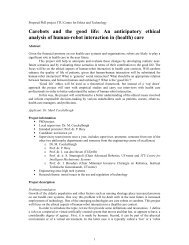Ethical issues in engineering design - 3TU.Centre for Ethics and ...
Ethical issues in engineering design - 3TU.Centre for Ethics and ...
Ethical issues in engineering design - 3TU.Centre for Ethics and ...
Create successful ePaper yourself
Turn your PDF publications into a flip-book with our unique Google optimized e-Paper software.
<strong>Ethical</strong> <strong>issues</strong> <strong>in</strong> eng<strong>in</strong>eer<strong>in</strong>g <strong>design</strong><br />
1.1.1 <strong>Ethical</strong> <strong>issues</strong><br />
Until now I have assumed that the reader knows <strong>in</strong>tuitively what ethical <strong>issues</strong><br />
are. I will now expla<strong>in</strong> <strong>in</strong> more detail the mean<strong>in</strong>g of the term “ethical” as used<br />
here. 3 I will call a problem an ethical or moral problem if moral values are at<br />
stake. In characteris<strong>in</strong>g moral values I will follow Thomas Nagel. Accord<strong>in</strong>g to<br />
Nagel, there are different sources of value, special allegiances, general rights,<br />
utility, perfectionist ends of self-development <strong>and</strong> <strong>in</strong>dividual projects, that cannot<br />
be reduced to each other or to more fundamental values. Values based on special<br />
allegiances are, accord<strong>in</strong>g to Nagel a result of a subject’s relationships to others<br />
<strong>and</strong> consist of special obligations to other people or <strong>in</strong>stitutions. General rights<br />
are rights that everyone has as a human be<strong>in</strong>g. These rights constra<strong>in</strong> action;<br />
actions that violate these rights are morally not permitted. Accord<strong>in</strong>g to Nagel,<br />
‘utility <strong>in</strong>cludes all aspects of benefit <strong>and</strong> harm to all people (or sentient be<strong>in</strong>gs)’<br />
[Nagel, 1979, 129]. Perfectionist ends of self-development refer to the <strong>in</strong>tr<strong>in</strong>sic<br />
value of certa<strong>in</strong> achievements. Nagel provides examples of the <strong>in</strong>tr<strong>in</strong>sic value of<br />
scientific discovery or artistic creation. The fifth type of value derives from<br />
<strong>in</strong>dividual projects. Nagel says that ‘this is value <strong>in</strong> addition to whatever reasons<br />
may have led to them <strong>in</strong> the first place’ [Nagel, 1979, 130]. An example Nagel<br />
gives is that if you have set out <strong>and</strong> started to climb to the top of Mount Everest<br />
then this project ga<strong>in</strong>s importance. <strong>Ethical</strong> theories usually focus on one of the<br />
sources of value. Kantianism focuses on universal rights. Utilitarianism only<br />
accounts <strong>for</strong> utility. Virtue ethics concentrates on perfectionist end of selfdevelopment.<br />
I do not want to limit myself to one source of value by choos<strong>in</strong>g a<br />
def<strong>in</strong>ition of ethical <strong>issues</strong> that refers only to utility or virtues or universal rights.<br />
In this thesis, <strong>issues</strong> that are related to one of the sources of moral values<br />
identified by Nagel are called ethical <strong>issues</strong> <strong>and</strong> decisions concern<strong>in</strong>g ethical<br />
<strong>issues</strong> are called “ethically relevant” decisions. For example, <strong>issues</strong> concern<strong>in</strong>g<br />
safety are related to utility but also to universal rights, there<strong>for</strong>e safety is an<br />
ethical issue. The term “ethical issue” only <strong>in</strong>dicates that the way eng<strong>in</strong>eers deal<br />
with an issue can be evaluated from an ethical po<strong>in</strong>t of view.<br />
This conception of ethical <strong>issues</strong> is used <strong>in</strong>dependently of what eng<strong>in</strong>eers<br />
themselves th<strong>in</strong>k are ethical <strong>issues</strong>. Eng<strong>in</strong>eers may or may not share this<br />
conception of ethical <strong>issues</strong>. Even <strong>in</strong> cases that eng<strong>in</strong>eers do not consider an<br />
issue to be ethical, if it is an ethical issue accord<strong>in</strong>g to the above conception I will<br />
treat it as such <strong>in</strong> this research. There might also be <strong>issues</strong> that eng<strong>in</strong>eers call<br />
ethical but that are not ethical <strong>issues</strong> accord<strong>in</strong>g to the above conception; these<br />
——————————————————————————————————<br />
3 Some philosophers <strong>in</strong>dicate that morality describes a code of conduct of a society or another<br />
group [Gert, 2002]. <strong>Ethics</strong> or moral philosophy is then construed to be a critical reflection on<br />
morality. I will use the terms “ethical” <strong>and</strong> “moral” <strong>in</strong>terchangeably.<br />
14



